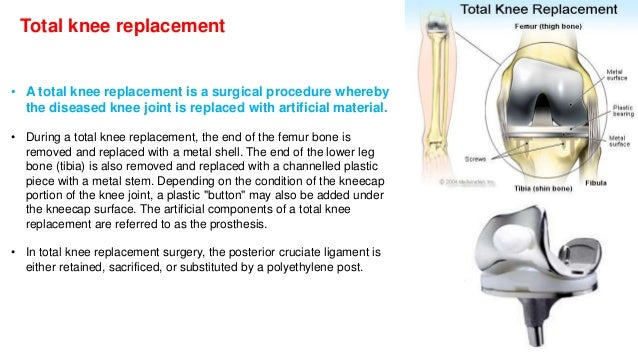
Following mentioned are the possible risks of delaying knee replacement surgery risk of deformities developing inside and outside the joint risk of muscles, ligaments and other structures becoming weak and losing function Knee replacement surgery like other major surgeries is a risk factor for the formation of blood clots.
Because a knee replacement affects the way blood flows around your knee, it can increase your risk of developing blood clots.
Knee replacement surgery risk. Most of the increased risk for blood clot in the legs or to the lungs is in the first 6 weeks after surgery persistent pain: When the patient is older than 75 years old, any surge can pose a risk (including total knee replacements). In fact, avoiding knee surgery increases the risk for chronic pain, lost hours on the job, treatments that do not work and a poor quality of life.
Risks of knee replacement surgery include:. Hence, the doctors focus more on treatments like medicine and physical therapy for elderly rather than recommending surgery. Yet now, according to new research, it may not be an appropriate target at all.
Because a knee replacement affects the way blood flows around your knee, it can increase your risk of developing blood clots. This causes a condition called a pulmonary embolism and can be fatal. Reasons when knee replacement is not possible.
Blood clots in the legs or lungs. The total knee replacement surgery is deemed safe by orthopedic surgeons. The risks of knee replacement surgery in the elderly are generally more than double compared to people under 65.
Following mentioned are the possible risks of delaying knee replacement surgery risk of deformities developing inside and outside the joint risk of muscles, ligaments and other structures becoming weak and losing function This risk information and surgical considerations are intended to be general guidance and each device may carry unique, specific risks and/or complications. Knee replacement carries the risk of a blood clot like deep vein thrombosis.
Risks of knee replacement surgery knee replacement surgery may carry some risks but usually,. Joints cannot be replaced if pain and inflammation persist. Getty images what are the risks of undergoing a total knee replacement?
Some of the reasons are: It has been used to ‘ration’ nhs knee replacements. Knee replacement surgery is your decision based on the advice of your surgeon, input from family and friends and a careful consideration of the facts, benefits and risks involved.
The knee replacement surgeon will ensure the knee function by bending and flexing the knee before closing the incision with stitches or staples. Common risks associated with total knee replacement surgery; 17 feb 2021 | general, knee surgery.
Severe and consistent pain is one of the major reasons patients decide to have knee replacement. The common risks associated with total knee replacement surgery include chronic pain, stiffness, urinary tract infection, chest pain, infection of the knee, blood clots, and shortness of breath. Yet, there may be factors that make it impossible for them to undergo this procedure.
Knee replacement surgery risks risks and complications of knee replacement surgery. In rare instances, the clot travels through the bloodstream and causes blockage either in the heart or in the lung. While knee surgery risks are rare, it�s better to know these risks before undergoing surgery.
As the knee continues to deteriorate, associated health problems arise. There are many types of knee surgery, but the most common include: After having a knee replacement, contact your doctor if you get:
Before a recommendation for surgery is made, doctors will focus on treatments first such as medicinal treatments or physical therapy. Lack of movement results in weakness and stiffness in the joint capsule, muscles, ligaments. Most people who have a knee replacement do not have serious complications.
A blood clot in the lungs known as pulmonary embolism may be fatal unless promptly treated. Risks of delaying knee surgery. It can increase surgical risk.
Deep sore in the skin beneath the knee, which can increase risk of infection. Up to 12% to 15% of patients with a. In rare cases, blood clots can cause serious complications including a pulmonary embolism (a blood clot in your lungs).
Knee replacement surgery provides relief for many patients. You have injured nerves in your knee area; Jeffrey carroll, we work towards our goal of restoring your knee’s function and range of motion.
Recovery time it may take up to six weeks for most patients to resume normal daily activities within 6 weeks and between three to six weeks to drive. Surgery to repair anterior cruciate ligament (acl) tears; Risks of total knee replacement include pulmonary embolism, bleeding, chronic knee pain, nerve damage, infection, and risks of anesthesia.
Other risks of knee replacement surgery include breathing difficulties, failure of the artificial joint, and allergic reaction among others. Knee replacement surgery like other major surgeries is a risk factor for the formation of blood clots. However, you may be worried about recovering from surgery.
A fracture during or after surgery. Over time this pain can lead to depression, anxiety, sleep problems, loss of intimacy, and risks of falling. Recovering from knee replacement surgery:
Pulmonary embolism, which can cause shortness of breath, chest pain, and even shock. Given the risks, your doctor may decide that knee replacement surgery is not appropriate if: Infection after knee replacement surgery is rare, but a knee replacement implant cannot defend itself from infection if bacteria are introduced to the.
Patients, whose arthritis is very severe, definitely need knee replacement surgery. Joint stiffness before surgery can affect mobility after surgery. What are the risks of undergoing a knee replacement surgery?
You have an infection or a history of infection you don�t have enough bone or the bone is not strong enough to support your new knee; The blood clots may form in the veins of the legs and may travel up to the lungs. Here is the complete list.
You have injured or nonfunctional knee muscles
